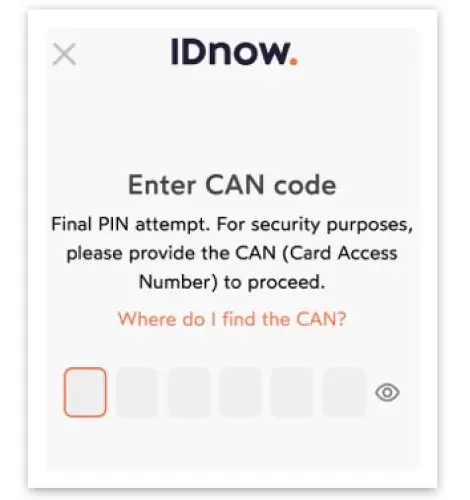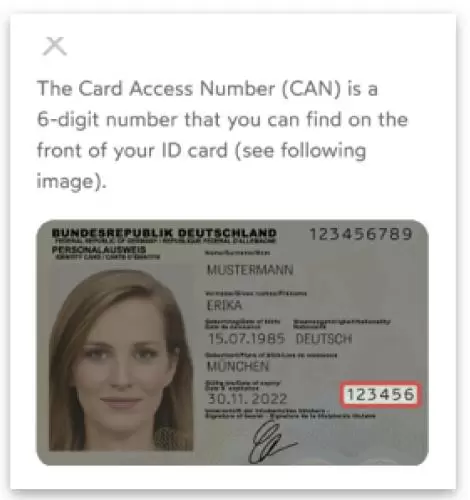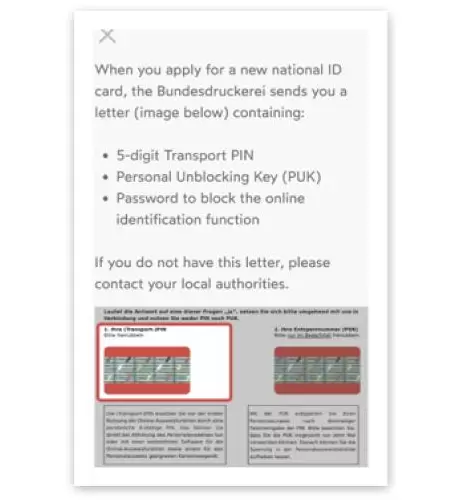- What do I need to know about German electronic ID cards?
- How does the smartphone read my card data?
- How secure is data storage on electronic ID Cards?
- What do PIN, CAN, PUK mean and why do I need them?
- Who can use IDnow eID?
- Which smartphones can be used?
- Is IDnow eID secure?
- Is eID a completely new IDnow product?
- What if I do not have a PIN or have forgotten it?
- Which data does IDnow read on the German electronic ID card for the identification process?
- Can I activate my electronic ID card using IDnow eID?
- Is eID a fully automated process?
Was it issued before or in/after 2017?
Was it issued before or in/after 2017?
You will not be able to use the IDnow eID with your card. Please select another identification method.
You can use IDnow eID.
Before you can use your ID card, you will need to activate it. You can do that directly on our app.
You can use IDnow eID.
You can use IDnow eID.
Before you can use your ID card, you will need to activate it. You can do that directly on our app.
You can use IDnow eID.
What do I need to know about German electronic ID cards?
German electronic ID cards were introduced in 2010. Since 2017, all new cards have been issued with an activation PIN.
There are three types of ID cards that can be used for identification:
- German Identity Card (Personalausweis)
- German Residence Permit (Aufenthaltstitel)
- eID Card for citizens of the European Union and European Economic Area
These cards all have an in-built chip which stores the user’s personal data.
Today there are over 60 million German ID cards and over 30 million of these have activated eID functionality. This number is increasing.
The eID identification process can be carried out by anyone who has their own German electronic ID Card. The online identification functionality must be enabled and it must have a PIN. In addition, you will need an NFC-enabled smartphone.
How does the smartphone read my card data?
The German electronic ID card contains a Radio Frequency Identification (RFID) upon which the user’s personal data is stored. The smartphone with an NFC interface reads this card data and transmits this via an encrypted channel to IDnow.
It is necessary to activate NFC in the smartphone settings before starting the eID process.
How secure is data storage on electronic ID Cards?
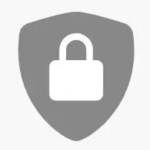
Data storage on electronic ID cards is extremely secure. They are highly resistent to duplication and tampering and use cryptographic keys to secure personal data. The card also works on the principle of mutual authentication which means both card holder and service provider need to prove their identity before data can be transferred.
What do PIN, CAN, PUK mean and why do I need them?
PIN is short for Personal Identification Number. If you hold an electronic ID card, you will either have a
- 5-digit PIN (Transport PIN or T-PIN), or a
- 6-digit PIN (Personal PIN)
Enter 5-digit PIN
The local authority sent you a letter containing your 5-digit Transport PIN.

You will have received your 5-digit Transport PIN from the German authorities by post after applying for an eID card. Using your 5-digit Transport PIN, you can create your 6-digit Personal PIN which activates the electronic ID card.
Create personal 6-digit PIN

Creating your 6-digit Personal PIN activates your electronic ID card. The card can then be used for online identification.
The CAN (Card Access Number) and PUK (Personal Unblocking Key) can assist if you forget your PIN or enter it incorrectly.
The CAN is a 6-digit number printed on the ID card itself. If you have already entered your PIN incorrectly twice, on the third (and final) attempt you will need to enter your CAN along with your PIN number.
If you enter the PIN incorrectly 3 times, the eID card will be temporarily blocked. This is where the PUK comes into the equation. You will need to enter this key to unblock your card if you wish to continue using it.
This particular feature is not offered by IDnow eID and must be performed using an application affiliated with the German government.
In the screenshots below you can see that we try to provide users with all the relevant information throughout this process.
Identification via IDnow eID
Who can use IDnow eID?
IDnow eID can be used by anyone who has a German eID Card which is activated for online ID functionality. You will also need a smartphone with an NFC interface, which most modern smartphones have.
Which smartphones can be used?
Only smartphones with an NFC interface can be used for IDnow eID.
Most modern smartphones have this. Click here to see a list of devices with NFC functionality
Is IDnow eID secure?
IDnow eID is completely secure. eID data is transmitted via end-to-end encryption and cannot be intercepted by external parties or viewed by anyone other than us.
Additionally, IDnow eID is compliant with the Anti-Money Laundering Act (AMLA) and Telecommunication Act (TCA).
Is eID a completely new IDnow product?
eID is integrated in IDnow VideoIdent and offers an additional identification solution within the IDnow platform. If you are unable to complete the identification process using eID, VideoIdent (identification via video call with an Ident Specialist) offers a fallback solution.
What if I do not have a PIN or have forgotten it?
You can always revert to VideoIdent which starts in the same app. This will allow you to continue the identification process.
Which data does IDnow read on the German electronic ID card for the identification process?
We read the following information to complete your identification process:
- First name
- Surname/Family name
- Date of Birth
- Place of Birth
- Address
- Validity period
- Nationality
Can I activate my electronic ID card using IDnow eID?
Yes, you are given the option at the beginning of the process to specify the type of PIN you have (see screenshot below). If you only have the 5-digit Transport PIN, choosing the first option allows you to enter a personal 6-digit PIN, thereby activating your eID card.
Once this is completed, you can then move on to identity verification using your personal 6-digit PIN.
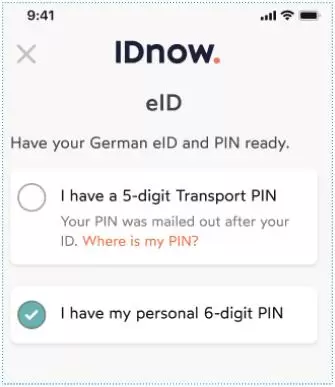
Is eID a fully automated process?
Yes, identification via eID is fully automated and does not require contact with an Ident Specialist.


